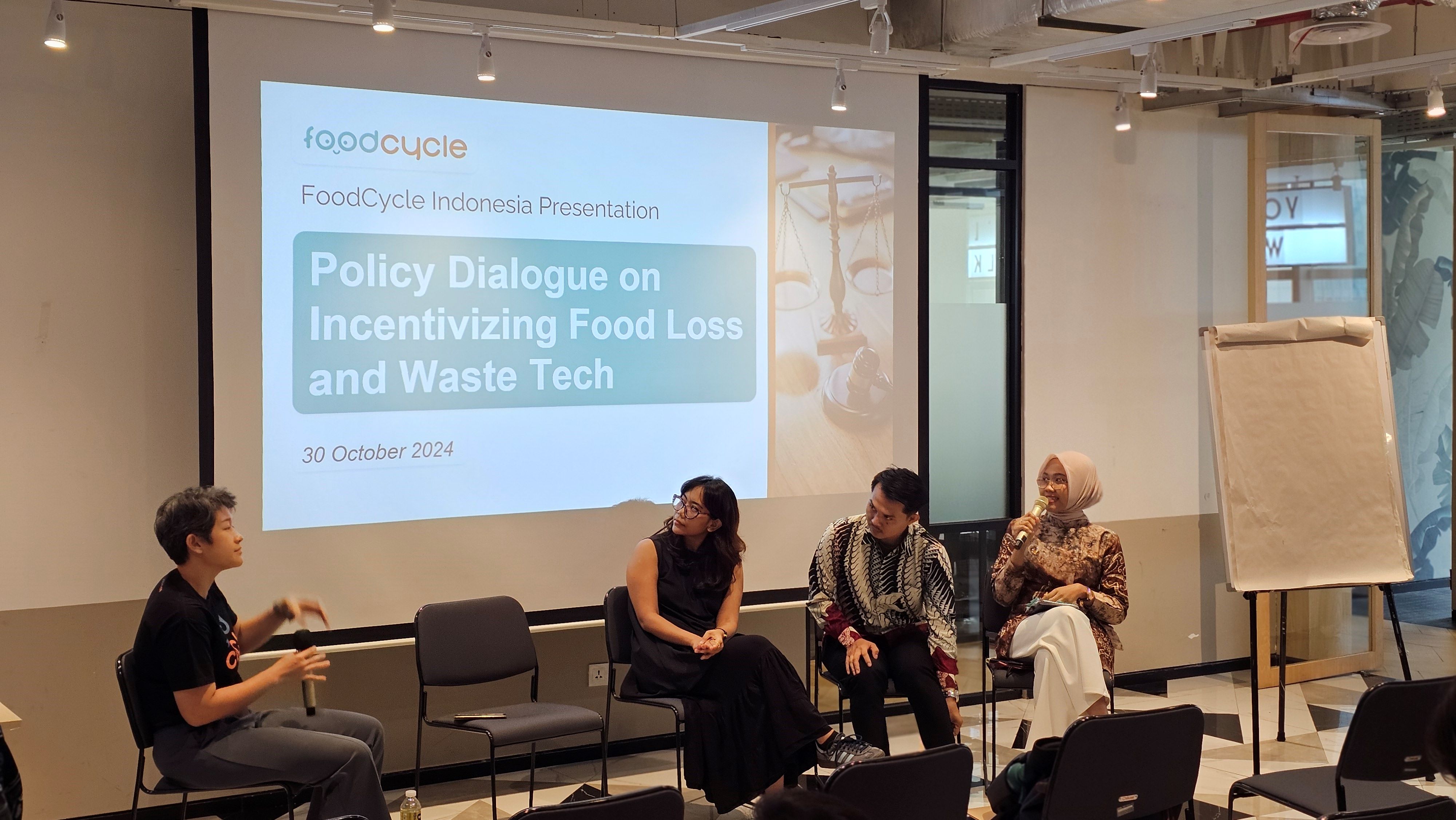Key Takeaways from a Policy Dialogue on Incentivizing Food Loss and Waste Reduction Technology

Country
Publication Date
2024-11-25
About
On October 30, 2024, P4G hosted a Policy Dialogue on “Incentivizing Food Loss and Waste Reduction Technology” in partnership with the Ministry of National Development Planning (Bappenas), the Embassy of Denmark in Indonesia, Indonesia Business Council for Sustainable Development (IBCSD), and World Resources Institute’s Food and Land Use Coalition team.
The dialogue highlighted the urgent need for acknowledging the potential of technology in supporting sustainable solutions in food loss and waste reduction. Around 50 key stakeholders from across sectors gathered to exchange insights, discuss challenges, and explore actionable policy recommendations that would support Indonesia’s Circular Economy Roadmap and the Roadmap for Managing Food Loss and Waste.
Key discussions centred around three essential themes:
- Standardizing definitions and metrics for food loss and waste (FLW) reduction in Indonesia
- Creating incentives for food, loss and waste reduction technologies
- Strengthening Indonesia’s innovation strategy for food loss and waste technological solutions
Irfan Martino, Coordinator of Food Sector, Directorate of Food and Agriculture, Bappenas, delivered the plenary. He shared the food loss and waste study conducted by Bappenas that found Indonesia was the second largest food loss and waste producer globally and wastes about 115 – 184 kilograms per person per year. He shared BAPPENAS’ strategic roadmap to reducing FLW and need for digital technology to play a role in reduction throughout the supply chain. Additional speakers included Nita Yulianis, Director of Food and Nutrition Surveillance, Bappenas, and Indah Budiani, Executive Director of IBCSD who shared the need for ensuring that existing policies received the support they needed and the importance of bringing economic and business stakeholders into the conversation.
Romaulii Pangabean from WRI presented the institute’s research collaboration in behavioural change strategies to contribute to Indonesia’s food loss and waste reduction goals. She raised the important point of ensuring that not only is awareness raised among consumers but also equally vital was finding the right and appropriate incentives to make sustainable lifestyle choices become long-term habits.
P4G National Platform Liaison, Sheila Teta Carina, also presented the mapping of food loss and waste technologies in Indonesia and the role of P4G partnerships in Indonesia in supporting the initiative.
The session continued with breakouts in which startups and nonprofits including FoodCycle, BIKI, ASEIC, RE:harvest, Surplus, Special Region of Yogyakarta Agriculture and Food Security Agency, and IBCSD shared their experiences and ideas that they would like public sector stakeholders to support.
Representatives from the nonprofit FoodCycle Indonesia brought up the challenge of single expiration dates in Indonesia which leads to a race against time to rescue edible food.
There was a deep discussion around best practices and suggestions to reduce FLW in hotel and restaurants. Participants discussed the issue the need for food regulations that protected donors such as hotels and restaurants who hesitate to donate their edible food because of the liability and the time involved to clear it for food donations. They also mentioned the need for better infrastructure to allow for safe and timely donations. Preliminary findings from WRI research in Bandung found that the hotel, restaurant, café/catering sector contributed to a large amount of waste with Saturdays and Sundays being the worst days of the week. One suggestion included targeting the problem through policy and internal (push and pull) incentives. Government or push incentives to reduce FLW could be through actions such as tax deductions for food donations and penalties for offenders. Internal or pull incentives could be making menu plans so they didn’t overstock or selling “ugly” produce at discounted rates.
Participants learned from the experiences of other countries who have had success in addressing food loss and waste. Jinhee Hwang from the Korean nonprofit ASEIC shared how the Republic of Korea implemented successful policy measures such as charging people disposal fees based on weight. The country also employs waste-to-energy technology that has reduced 47,000 tons of waste over six years and generated energy for 20,000 households.
Joanne Loi from Novonesis, a biotechnology company, shared how biotech solutions can help with this challenge by helping upcycle edible food waste into nutritious products and keeping perishable food fresher for longer. Agung Saputra, from Surplus, presented impact reporting as a tool to attract hotel and restaurants to work in food rescue initiatives.
The wide-ranging session yielded multiple policy recommendations around standardization and food labelling; financial incentives and support; and government support for recycling/upcycling technologies.
A few top policy takeaways included:
- Improving regulations around food rescue
- Raising consumer awareness of food labelling regarding “use-by” and “best-before” dates
- Creating mandatory incentives for the hospitality sector to change their standard operating procedures and reduce food waste
- Creating disincentives for food waste and ensuring more robust data collection to accurate track waste and tie it to carbon emissions
These suggestions, if adopted, would support the scaling of food loss and waste reduction technologies and funding for this sector, which is crucial to meeting Indonesia's sustainability goals.
The discussions and insights gathered during the dialogue will be consolidated into actionable policy recommendations in the form of policy briefs to advance food loss and waste management in Indonesia, especially towards the review of Indonesia's National Strategic Pathway for Food Systems Transformation. These recommendations will serve as a foundation for collaborative efforts to reduce food loss and waste, enhance food security, and support Indonesia's long-term sustainability goals.
